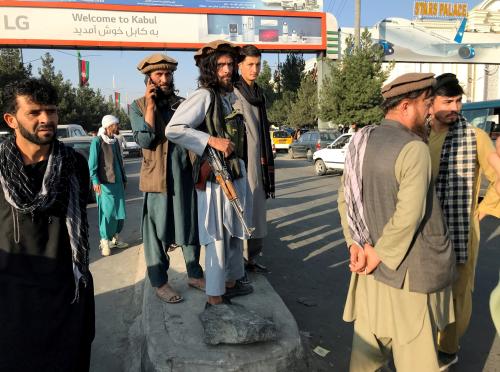Former Ambassador Richard C. Holbrooke, Senator Jon S. Corzine (D-NJ), and Francis Deng of the Brookings-SAIS Project on Internal Displacement today described their recent visits to Darfur and detailed what is needed to end the ethnic conflict that has devastated the western region of Sudan.
“This is singularly, the most horrific situation that I have ever come in contact with,” Corzine said at a panel discussion at the Brookings Institution. Holbrooke, who served as U.S. ambassador to the United Nations from 1999 to 2001, called it “the most serious humanitarian emergency in the world today.”
Armed conflict in the region has left nearly 1.5 million people homeless, 50,000 dead, and hundreds of thousands susceptible to potentially life-threatening diseases. The humanitarian crisis has prompted Congress and Secretary of State Colin Powell to declare the situation a genocide. Although the U.N. Security Council in July gave the Sudanese government 30 days to protect Darfur’s citizens, only monitors have been deployed, and innocent civilians continue to be murdered, raped, and forcibly evicted from their homes.
The situation has evoked memories of the Rwandan genocide in the 1990s, when millions were killed while the international community stood idly by. The haunting lessons of Rwanda, the panelists said, should motivate the international community to act decisively and quickly.
The panel agreed that the African Union was best equipped to deal with the crisis. According to Deng, the corrupt Sudanese government, which supports the Muslim-dominated Janjaweed militias responsible for the ethnic bloodshed, cannot be trusted to fully and transparently confront the problem. In addition, any international effort to directly confront the Sudanese government could spark intense resistance and calls for a Holy War. An intervention by the African Union, by contrast, would keep the matter in African hands.
“If the African Union were to fail, because the [Sudanese] government has not been cooperative,” Deng said, “and they came back to the United Nations to say ‘We’ve failed’, then the idea of international intervention would be more compelling, and the African Union would have virtually given legitimacy to the involvement of the international community.”
However, the panelists maintained that the international community still had a role to play by providing humanitarian aid, logistical support, and much-needed equipment such as planes, automobiles, helicopters, and communications gear.
“The situation in Darfur lays down a moral imperative that the U.S. and the global community take real action, not just spew a lot of words,” Corzine said. “It’s time to get off our tails and actually act.”
Although Holbrooke said that the “humanitarian spigot” had been opened, international efforts still have fallen far short. Holbrooke, an advisor to Democratic presidential candidate John Kerry, applauded Powell for visiting the region recently, but called the Bush administration’s pledge of $20 million in 2004 “insufficient.” Corzine agreed, saying that “the United States and international institutions ought to be providing financial and logistical support” to the African Union.
With the presidential election less than two months away, the crisis has potential political implications. But Holbrooke expressed hope that it not become part of the campaign.
“This is not a partisan issue,” Holbrooke said. “There is no political advantage in this issue. It is a bipartisan issue. Lives are at stake, and bipartisanship is the only appropriate response.”


Commentary
Op-edEvent Summary: The Crisis in Sudan
September 14, 2004